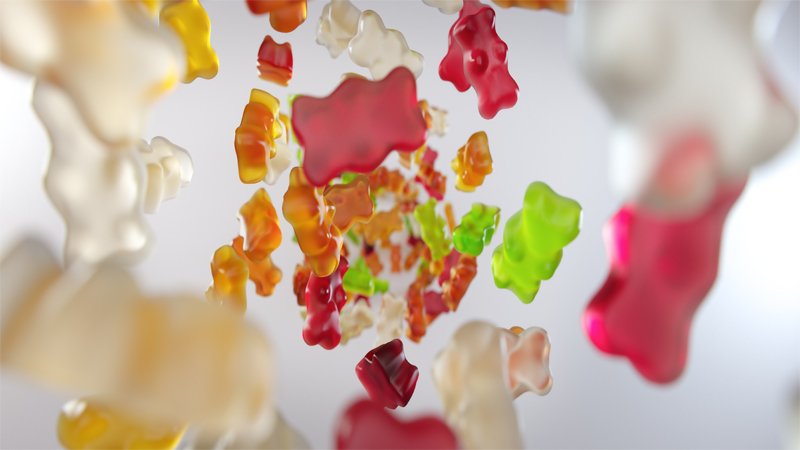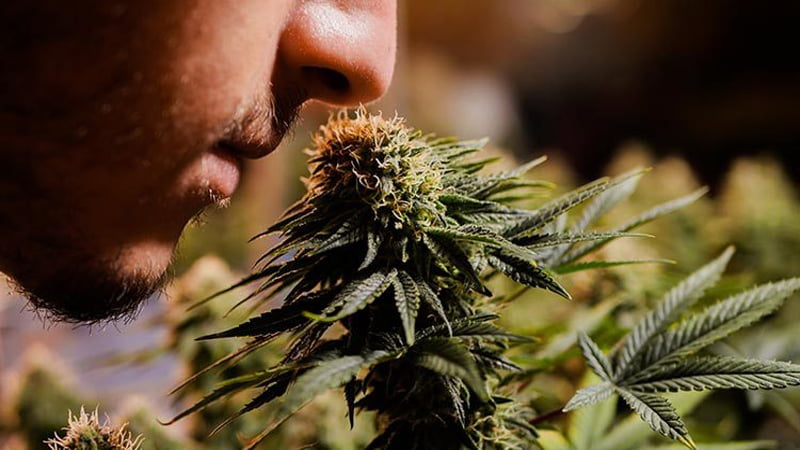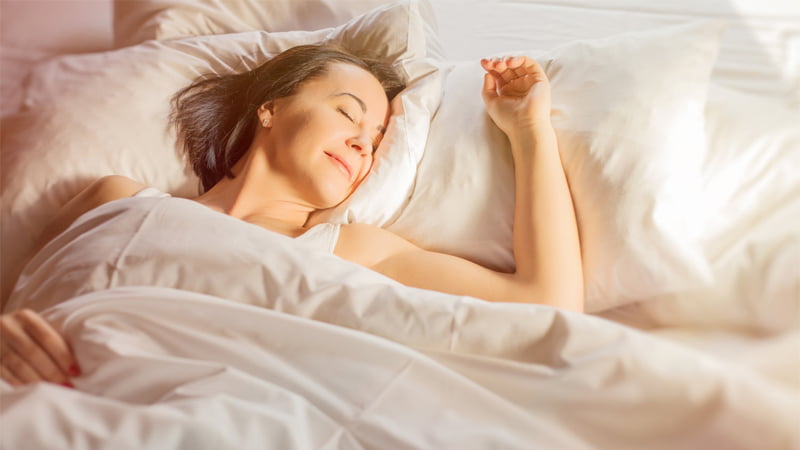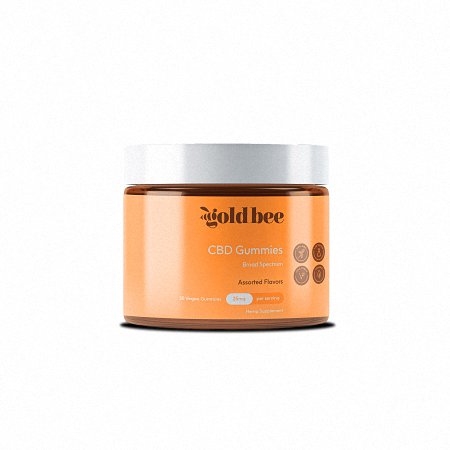Looking for the best sleep gummies? This article contains a ranking of the top brands and discusses the issue of sleep deprivation — and how to fight it.
Sleep is an essential component of our health.
During the night, the body can replenish its energy and regenerate enough so that you’re ready to start another day with optimized energy levels.
Sleep deprivation, in turn, can take a serious toll on our daily lives.
Even one sleepless night can negatively impact our cognition, focus, mood, and physical parameters.
Sleep deprivation has been linked to many chronic conditions, including depression, fatigue, hypertension, obesity, and hormonal imbalances.
It’s no wonder sleep supplements like gummies are in demand.
Wondering where you can get the best treats for better sleep?
Below you’ll find my recommendations — along with a comprehensive guide to getting enough quality sleep.
Best Gummies for Sleep
1. Area 52
| Type of Extract | Full Spectrum |
| CBN Potency | 25 mg |
| CBD Potency | 25 mg |
| Additional Ingredients | Passionflower, 5-HTP, lemon balm, l-theanine, chamomile, melatonin |
| Flavors | Mango |
Area 52 specializes in various cannabinoid-based extractions from organic hemp. The brand started out making delta 8 THC products like gummies, tinctures, and vapes — and has quickly followed through with a collection of other cannabinoids after its initial success.
Today, you can find CBD, CBG, and CBN extracts on top of the delta 8 line-up.
The Area 52 sleep gummies come with a 1:1 ratio between CBN and CBD, including relaxing terpenes such as myrcene, humulene, and caryophyllene.
The formula also contains common natural sleep aids, such as melatonin, passionflower, 5-HTP, l-theanine, and lemon balm.
This combination of pacifying ingredients, along with a well-designed phytocannabinoid formula, makes this product one of the best sleep gummies on the market right now.
2. Gold Bee
| Type of Extract | Full Spectrum |
| CBN Potency | 25 mg |
| CBD Potency | 25 mg |
| Additional Ingredients | Passionflower, 5-HTP, lemon balm, l-theanine, chamomile, melatonin |
| Flavors | Strawberry |
Gold Bee was established in 2019 as a brand specializing in CBD and Kava products. Today, the company has become a true powerhouse, offering CBD and CBN products on top of its classic selection of extracts.
What makes Gold Bee such a unique company is that its products are all-organic and contain various superfoods that complement the health benefits of cannabinoids and terpenes.
Every product batch is thoroughly tested in a third-party laboratory for potency and contaminants, including pesticides, solvents, and mycotoxins. You can view the certificates of analysis directly on the Gold Bee website.
The Gold Bee gummies feature the same formula as the Area 52 sleep gummies, containing 25 mg of each CBD and CBN, a blend of sedating terpenes, and natural sleep enhancers like chamomile, melatonin, lemon balm, l-theanine, and 5-HTP.
The only difference is in flavor. The Gold Bee sleep gummies taste like fresh strawberries, while the Area 52 product is redolent of mangoes. Knowing all these you can start looking for Gold Bee’s gummies at stores near you.
What to Look for in Sleep Gummies?

Sleep gummies are formulated with certain ingredients that induce sleep or regulate our circadian clock to fix troubles with falling asleep and staying asleep through the night.
Here are some common natural supplements that you should look for in sleep gummies. In this section, I’ll cover vitamins, minerals, herbal supplements, adaptogens, and cannabinoids.
Melatonin
Melatonin is a natural compound known as our “sleep hormone.” Increased production of melatonin signals the brain that it’s time to go to sleep, while lower levels promote alertness.
Usually, we have lower concentrations of melatonin in the morning — and higher in the evening.
For individuals who have disrupted melatonin cycles, sleep gummies with melatonin may become a viable option to restore the balance.
Several studies have shown that melatonin improves sleep duration and quality, which may be particularly useful for individuals who work on shifts and thus have tighter schedules.
Moreover, melatonin may improve overall sleep quality in those suffering from sleep disorders; namely, it can reduce the time people need to fall asleep (sleep latency) and increase the total amount of sleep.
Melatonin is safe for adults, both as a means of intervention and as a daily supplement.
Lavender
The lavender plant can be found on almost every continent. It serves a broad range of household purposes when dried. But the best part about lavender is that its floral fragrance can calm the mind and improve sleep quality.
Simply smelling lavender essential oil shortly before bed can help the user fall asleep faster, according to studies. This effect can be often observed in those with mild insomnia — especially in younger people and women.
One small study on dementia patients has shown that lavender can also reduce the symptoms of sleep disturbances.
That being said, remember that lavender essential oil shouldn’t be consumed orally, as it can cause stomach irritation and pain. The best way to experience its benefits for sleep is to inhale it or eat sleep gummies infused with linalool (a dominant terpene in lavender).
Chamomile
This herb has a subtle floral aroma and shows potential in reducing stress.
Chamomile is a rich source of an antioxidant called apigenin, which can relax muscles and support healthy sleep.
A review of scientific literature found that chamomile was able to safely improve sleep in healthy individuals.
However, the plant didn’t have a significant effect on people with insomnia.
Another study found that chamomile contributed to a reduction of sleep difficulties in women compared with a control group.
Still, it’s too early to draw definitive conclusions about the sedative properties of chamomile.
5-HTP
Research has shown that 5-HTP can be successful in treating insomnia due to its interaction with serotonin.
Serotonin is a key neurotransmitter body. Melatonin, which tells your body that it’s time to go to bed, is formed from serotonin. 5-HTP helps regulate the production of both serotonin and melatonin; it can also reduce stress and anxiety — contributing to fewer sleep problems.
Since serotonin is also a mood stabilizer, supplementation with 5-HTP may keep you in a good mood, translating into less stress overall.
Cannabinoids
Cannabinoids are naturally occurring compounds in cannabis plants. They interact with the largest self-regulatory network in the body known as the endocannabinoid system (ECS).
The ECS promotes and helps maintain homeostasis, which is a fancy term for balance between all your biological processes.
This includes memory, mood, body temperature, pain perception, reactions to fear and stress, immune function, fertility, hormonal balance, appetite, neuroprotection, and sleep cycles.
People have been using cannabis as a sleep aid for centuries. The sedating effects of cannabis are attributed to some of its cannabinoids, such as CBD, CBN, and THC — mostly due to their interaction with the cannabinoid receptors in the brain and nervous system.
Due to legal matters, we’ll devote a separate article to the potential benefits of THC for sleep in the future. For now, let’s focus on the other two.
CBN for Sleep
CBN has recently become popular as a sleep aid. Higher concentrations of this cannabinoid occur in aged cannabis plants. Since people who smoke aged weed report feeling sedated after their sesh, they correlate it with the higher levels of CBN.
However, as observed by an esteemed cannabis researcher Dr. Ethan Russo, it’s not necessarily the CBN, but a combination of oxidized terpenes that makes us sleepy — which is another reason why aged cannabis makes us sleepy.
Another possibility is that CBN can potentiate the sedating qualities of THC, as shown by a 1975 study that analyzed the effects of cannabis on sleep.
The research team noted that isolated CBN didn’t make a significant difference in the sleep quality of the subjects, but when it occurred alongside other cannabinoids and terpenes, it amplified their sleep-inducing effects.
So, to wrap it up, CBN alone may not be a potent sleep aid, but things start to change when you consume it together with other cannabis compounds.
CBD for Sleep
CBD can affect our sleep cycles in a few ways.
First, it can act as a wake-promoting agent when taken in low doses. It can also improve our ability to focus, reducing feelings of tiredness.
This trait is very important because if you are productive throughout the day, your body can produce melatonin more effectively, restoring the balance in your circadian rhythm.
On the other hand, higher doses of CBD tend to lower blood pressure, resulting in slower breathing and inducing sleepiness.
Lastly, CBD can help reduce some of the symptoms that cause sleep deprivation, such as anxiety, muscle tension, and pain.
So, while CBD doesn’t directly put you to sleep, it can set the right gears in motion to help your body fall asleep easier and spend more time in the deep sleep stage.
Terpenes

When you eat cannabinoid-based gummies for sleep, such as full-spectrum CBD or CBN gummies, it’s important to look at the terpene profile of your product.
Terpenes are aromatic molecules that occur in every plant on this planet. On top of providing cannabis plants with their distinctive aromas and flavors, terpenes also work synergistically with cannabinoids to enhance their health benefits and add some therapeutic effects on their own.
This synergy is known as the entourage effect.
There are three terpenes that are particularly known for their sleep-inducing properties:
- Myrcene: Myrcene is known for its sleep-inducing effects. It can also increase the permeability of the blood-brain barrier, increasing the potency of other cannabinoids and terpenes. You can find it in most cannabis strains, mangoes, cloves, and basil.
- Humulene: Humulene produces a hoppy aroma (because it’s the most abundant terpene in hops) and as such is known for its relaxing properties and the ability to induce a happy mellow mood.
- Caryophyllene: This terpene can ease stress, anxiety, and pain, and similarly to CBD, this can translate into better sleep quality. Caryophyllene has an earthy, peppery, and woody aroma.
Magnesium
Magnesium is a mineral that modulates hundreds of processes within the body, including proper brain function, cardiovascular performance, sleep cycles, and muscle movements.
Magnesium may also induce a calming state of mind, not to mention that — like 5-HTP — it can regulate the production of melatonin.
One study showed that a combination of magnesium, vitamin B12, and melatonin was effective at treating insomnia in all subjects.
Magnesium deficiencies may be the cause of sleep disturbances.
On the other hand, increasing your magnesium intake may improve the quantity and quality of your sleep.
Another study tested a dose of 500 mg of magnesium or placebo among participants. The group that was taking magnesium benefited from overall improvements in sleep quality, scoring higher levels of melatonin and renin.
Taste & Packaging
Now let’s jump off the science ship for a second. The eating experience is almost as important as the effects; that’s because you may have the best formula ever, but you won’t force people to eat it when it tastes bad.
The best CBD sleep gummies are made with natural ingredients and contain fruit juices and concentrates as colorings and flavorings. I would steer clear of any sleep gummies that come with synthetic additives, preservatives, or wheat; these are unnecessary fillers that can worsen your sleep problems.
In a perfect world, the gummies should be sold in glass jars, but because paper is more affordable, sports companies are turning to paper bags as an eco-friendly way of packaging.
Third-Party Testing
Not all supplements are subject to quality and purity regulations. Trustworthy manufacturers are aware of that fact and test their products in third-party laboratories to confirm their sleep gummies are safe for people.
A laboratory is considered third-party if it’s not affiliated with the manufacturer. Such facilities run complete analyses of the chemical profile of the tested sample, including the potency of the active ingredients and results for common contaminants, such as pesticides, herbicides, heavy metals, solvents, or microbial impurities.
If the product passes the screening, it receives a Certificate of Analysis (COA). Reputable brands offering high-quality sleep gummies publish these certificates on their websites.
Causes of Sleep Deprivation

Numerous factors can cause or contribute to sleep deprivation, including sleep hygiene, lifestyle choices, work environment, sleep disorders, or underlying medical conditions.
Here I outline the most common causes of sleeplessness.
Voluntary Choice to Reduce Sleep Time
People tend to blame outside forces for every bad thing that happens in their life. But the truth is that we’re 100% responsible for our actions, and most of our sleep deprivation results from voluntary choices to reduce sleep time.
This may be caused by working overnight, binging on your computer games or a favorite series, or staying awake in bed being bothered by racing thoughts — that you brought on you.
Because you control your thoughts and choices, not some non-existent figure that forces you to deprive yourself of sleep.
An inconsistent sleep schedule may fuel these decisions and make them feel appropriate (and less intentional) at the moment.
Work Obligations
Work duties are another common reason why we don’t get enough sleep. People who work for extended hours or work multiple jobs don’t have enough time for sufficient sleep.
Shift workers are particularly exposed to sleep disturbances because night shifts can significantly disrupt their melatonin cycle.
Sleep Disorders
Sleep deprivation may be caused by other sleep disorders, such as snoring, sleep apnea, or insomnia. These disorders may induce dozens of nightly awakenings, may impair both sleep duration and quality — and deteriorate your overall satisfaction from life.
Underlying Medical Conditions
People with underlying medical conditions, such as chronic pain, depression, cancer, or autoimmune diseases, may not be able to get that full shut-eye time due to the pesky symptoms that prevent them from falling asleep or cause them to wake multiple times during the night.
Eating Late
When you eat late in the evening or at night — shortly before going to bed — your body will be focused on digesting and metabolizing the food rather than on recharging your inner batteries.
You can run a simple test on that. On one day, eat your last meal slightly before the sunset, and the other day, eat something shortly before going to sleep — and I’m sure you’ll notice the difference in your energy levels and mindset the next morning.
Above all, don’t eat too much protein before bed because they take the most time to break down all macronutrients.
Chronic Stress
A little stress from time to time isn’t bad. It’s a healthy reaction of your body against an upcoming danger. It signals you to stay alert and either fight your enemy or try to run away.
But, if you get chronically stressed without an actual threat to your health and life — but simply because you didn’t finish your work on deadline — then it’s not normal.
Moreover, chronic stress can take a serious toll on your physiological and mental functions, including your mood, energy levels, and the ability to fall asleep and stay asleep through the night.
Lack of Exercise
Contrary to popular opinion, avoiding exercise to save energy may backfire on you. When you feel tired from last night and decide to have a lazy day, you may have problems falling asleep in the evening.
When you’re not productive during the day, your brain receives signals from your neurons that, “Hey, you haven’t done anything yet, let’s stay awake!”
Aaaaand the vicious circle continues to spin.
If you feel sluggish, give yourself a decent workout, and you’ll fall asleep like a baby. Just don’t lift weights or do high-intensity training in the evening because doing so may overstimulate your nervous system and result in further sleep deprivation.
Consequences of Chronic Sleep Deprivation
Sleep deficiency is a serious risk factor for a wide range of diseases.
Acute sleep deprivation is a common cause of unintentional errors and accidents. Drowsy people have shorter attention spans and slower reactions, not to mention the risk of microsleeps, which can be life-threatening if you’re driving a car, for example.
Chronic deprivation, on the other hand, is associated with symptoms like high blood pressure, coronary heart disease, obesity, heart attack, and stroke.
How to Improve Sleep Quality

You don’t need to become a biohacker overnight. There are some simple solutions out there that can help you improve your sleep quality to a great extent.
Just remember that sleep hygiene is a complex subject, so trying to solve a riddle with a single piece of a puzzle is a fool’s errand. You need to take care of several areas of your life to return your sleep patterns to normal.
Here’s what you can do about it (besides eating sleep gummies).
Reduce Exposure to Blue Light Wavelengths in the Evening
Exposure to all colors of light helps control your natural sleep-and-wake cycle; that’s why we see different wavelengths throughout the day.
However, when you expose yourself to blue light in the evening, it messes with your body’s ability to produce melatonin, blocking it from performing its function.
Go to Bed Early
There’s a reason why the sun rises and sets. Unlike cats and other nightly predators, humans devote this time to sleep to be full of energy for the next day.
Staying awake at night isn’t natural for us.
It causes you to wake up later, reducing your chances of being productive that day and thus increasing the risk of sleeplessness at night.
And if you even wake up earlier, you’ll probably be tired and need a direct boost of energy (such as coffee or energy gummies).
Establish a Proper Daily Routine
People like having habits. It creates a sense of control over one’s life, where not everything happens according to spontaneous decisions. Life is also about habits. You wake up in the morning, do your job, spend some time unwinding, take care of yourself, and go to bed when everything is done.
If your life is in chaos, you can’t expect your sleep patterns to work in order. Discipline is paramount if you want to make sure you go to bed at the right time and don’t turn the tryhard mode on when you only have two last episodes to watch on Netflix.
Eat Nutritious Food
Sleep deprivation causes hormonal imbalances — and vice versa.
Where do we get hormonal imbalances from?
This can be our environment or a poor diet.
In the case of the latter, eating processed food that’s high in sugar and hydrogenated fats, missing out on nutrient-dense products, and drinking soda instead of water can wreak havoc on your hormones.
From binge eating to stuffing yourself at night with junk food, bad eating habits are the major cause of nutrient deprivation.
When your hormones go out of whack, it’s difficult to maintain proper functions, such as appetite, digestion, mood, memory, and sleep.
Having a proper diet can help improve your sleeping experience, adding an intake of gummies for sleep with the right dosage can greatly improve your sleeping quality.
Take Care of Your Stress Hygiene
You can bolster your stress response in many ways, from behavioral techniques to eating the right food, exercising regularly, and taking vitamins and minerals.
The most important thing to realize is that most of the time, chronic stress comes from generalized anxiety, which is caused by imbalances in your nervous system. Every time you freak out due to a potential dark scenario, you damage your nervous system.
It’s like rubbing a hand on a desk. A minute or two won’t hurt but try doing this several times a day for a month, and you’ll notice the damage.
Key Takeaways on the Best Gummies for Sleep
About 70 million Americans have chronic sleep problems. That’s a staggering number.
It’s no wonder that people are looking for natural remedies for sleep. Conventional sleeping pills are not effective in the long run, let alone their long-term side effects and potential for abuse.
Sleep gummies are a decent option for leveling your sleep deficiencies. With the right ingredients, not only can they help you fall asleep faster, but they can also modulate your circadian rhythm to restore much-needed balance.
That being said, remember that even the best sleep gummies won’t substitute a healthy diet, proper stress hygiene, and the right amount of exercise.
I hope that you’ll manage to get your ZZZs back to normal using the tips from this article.
See you soon!
Sources:
- Sadeghniiat-Haghighi, K., Bahrami, H., Aminian, O., Meysami, A., & Khajeh-Mehrizi, A. (2016). Melatonin therapy in shift workers with difficulty falling asleep: A randomized, double-blind, placebo-controlled crossover field study. Work (Reading, Mass.), 55(1), 225–230. https://doi.org/10.3233/WOR-162376
- Ferracioli-Oda, E., Qawasmi, A., & Bloch, M. H. (2013). Meta-analysis: melatonin for the treatment of primary sleep disorders. PloS one, 8(5), e63773. https://doi.org/10.1371/journal.pone.0063773
- Costello, R. B., Lentino, C. V., Boyd, C. C., O’Connell, M. L., Crawford, C. C., Sprengel, M. L., & Deuster, P. A. (2014). The effectiveness of melatonin for promoting healthy sleep: a rapid evidence assessment of the literature. Nutrition Journal, 13, 106. https://doi.org/10.1186/1475-2891-13-106
- Lillehei, A. S., Halcón, L. L., Savik, K., & Reis, R. (2015). Effect of Inhaled Lavender and Sleep Hygiene on Self-Reported Sleep Issues: A Randomized Controlled Trial. Journal of alternative and complementary medicine (New York, N.Y.), 21(7), 430–438. https://doi.org/10.1089/acm.2014.0327
- Koulivand, P. H., Khaleghi Ghadiri, M., & Gorji, A. (2013). Lavender and the nervous system. Evidence-based complementary and alternative medicine : eCAM, 2013, 681304. https://doi.org/10.1155/2013/681304
- Takeda, A., Watanuki, E., & Koyama, S. (2017). Effects of Inhalation Aromatherapy on Symptoms of Sleep Disturbance in the Elderly with Dementia. Evidence-based complementary and alternative medicine : eCAM, 2017, 1902807. https://doi.org/10.1155/2017/1902807
- Hieu, T. H., Dibas, M., Surya Dila, K. A., Sherif, N. A., Hashmi, M. U., Mahmoud, M., Trang, N., Abdullah, L., Nghia, T., Y, M. N., Hirayama, K., & Huy, N. T. (2019). Therapeutic efficacy and safety of chamomile for state anxiety, generalized anxiety disorder, insomnia, and sleep quality: A systematic review and meta-analysis of randomized trials and quasi-randomized trials. Phytotherapy research: PTR, 33(6), 1604–1615. https://doi.org/10.1002/ptr.6349
- Chang, S. M., & Chen, C. H. (2016). Effects of an intervention with drinking chamomile tea on sleep quality and depression in sleep disturbed postnatal women: a randomized controlled trial. Journal of advanced nursing, 72(2), 306–315. https://doi.org/10.1111/jan.12836
- Maffei M. E. (2020). 5-Hydroxytryptophan (5-HTP): Natural Occurrence, Analysis, Biosynthesis, Biotechnology, Physiology, and Toxicology. International journal of molecular sciences, 22(1), 181. https://www.ncbi.nlm.nih.gov/labs/pmc/articles/PMC7796270/ [1]
- Russo E. B. (2011). Taming THC: potential cannabis synergy and phytocannabinoid-terpenoid entourage effects. British journal of pharmacology, 163(7), 1344–1364. https://doi.org/10.1111/j.1476-5381.2011.01238.x
- Karniol, I. G., Shirakawa, I., Takahashi, R. N., Knobel, E., & Musty, R. E. (1975). Effects of delta9-tetrahydrocannabinol and cannabinol in man. Pharmacology, 13(6), 502–512. https://doi.org/10.1159/000136944
- Murillo-Rodríguez, E., Sarro-Ramírez, A., Sánchez, D., Mijangos-Moreno, S., Tejeda-Padrón, A., Poot-Aké, A., Guzmán, K., Pacheco-Pantoja, E., & Arias-Carrión, O. (2014). Potential effects of cannabidiol as a wake-promoting agent. Current neuropharmacology, 12(3), 269–272. https://doi.org/10.2174/1570159X11666131204235805
- Jadoon, K. A., Tan, G. D., & O’Sullivan, S. E. (2017). A single dose of cannabidiol reduces blood pressure in healthy volunteers in a randomized crossover study. JCI insight, 2(12), e93760. https://doi.org/10.1172/jci.insight.93760
- Surendran, S., Qassadi, F., Surendran, G., Lilley, D., & Heinrich, M. (2021). Myrcene-What Are the Potential Health Benefits of This Flavouring and Aroma Agent?. Frontiers in nutrition, 8, 699666. https://www.ncbi.nlm.nih.gov/labs/pmc/articles/PMC8326332/ [2]
- Richter, G. and Makriyannis, A. (2021). Cannabis Sativa: An Overview. Humulene. Science Direct. Available from: https://www.sciencedirect.com/topics/agricultural-and-biological-sciences/humulene
- Hashiesh, H. M., Meeran, M., Sharma, C., Sadek, B., Kaabi, J. A., & Ojha, S. K. (2020). Therapeutic Potential of β-Caryophyllene: A Dietary Cannabinoid in Diabetes and Associated Complications. Nutrients, 12(10), 2963. https://pubmed.ncbi.nlm.nih.gov/32998300/ [3]
- Djokic, G., Vojvodić, P., Korcok, D., Agic, A., Rankovic, A., Djordjevic, V., Vojvodic, A., Vlaskovic-Jovicevic, T., Peric-Hajzler, Z., Matovic, D., Vojvodic, J., Sijan, G., Wollina, U., Tirant, M., Thuong, N. V., Fioranelli, M., & Lotti, T. (2019). The Effects of Magnesium – Melatonin – Vit B Complex Supplementation in Treatment of Insomnia. Open access Macedonian journal of medical sciences, 7(18), 3101–3105. https://www.ncbi.nlm.nih.gov/labs/pmc/articles/PMC6910806/ [4]
- Ikonte, C. J., Mun, J. G., Reider, C. A., Grant, R. W., & Mitmesser, S. H. (2019). Micronutrient Inadequacy in Short Sleep: Analysis of the NHANES 2005-2016. Nutrients, 11(10), 2335. https://www.ncbi.nlm.nih.gov/labs/pmc/articles/PMC6835726/ [5]
- Abbasi, B., Kimiagar, M., Sadeghniiat, K., Shirazi, M. M., Hedayati, M., & Rashidkhani, B. (2012). The effect of magnesium supplementation on primary insomnia in elderly: A double-blind placebo-controlled clinical trial. Journal of research in medical sciences: the official journal of Isfahan University of Medical Sciences, 17(12), 1161–1169.
- Institute of Medicine (US) Committee on Sleep Medicine and Research; Colten HR, Altevogt BM, editors. Sleep Disorders and Sleep Deprivation: An Unmet Public Health Problem. Washington (DC): National Academies Press (US); 2006. 3, Extent and Health Consequences of Chronic Sleep Loss and Sleep Disorders. Available from: https://www.ncbi.nlm.nih.gov/books/NBK19961/

 The Best Legal Delta 9 Near You in Park Forest North
The Best Legal Delta 9 Near You in Park Forest North 

Be the first to comment